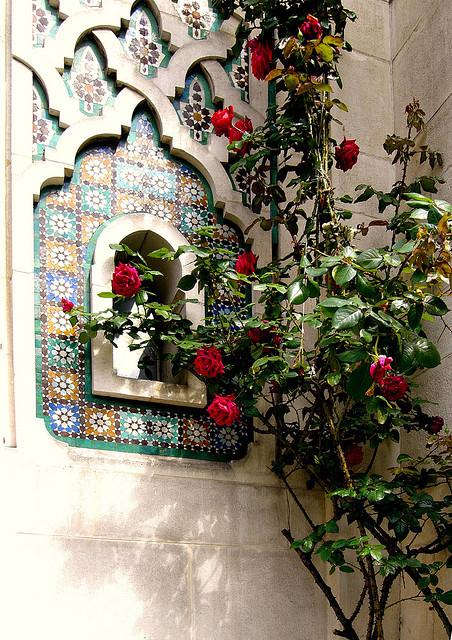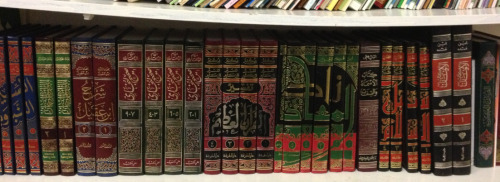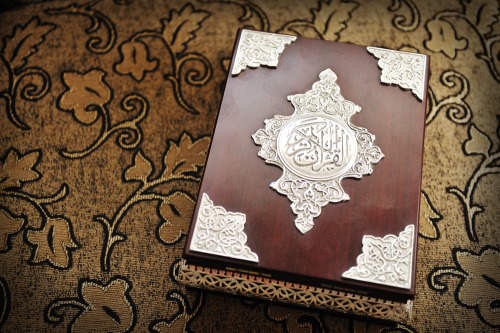Wednesday, 26 February 2014
Monday, 24 February 2014
And if they desire children in Jannah!…
Upon the authority of Abu Sa’eed Al
Khudri (Radhiyallaahu ‘Anhu) who said that the Messenger of Allah – (sallallaahu
‘alayhe wa sallam) said: “If the believer desires a child in Jannah,
then pregnancy, child birth and the child coming of age occurs in an hour (or in
a short period) and the child is just as they desire!
[Source: Collected by Ahmad 11079
and Tirmidhi (2563) and declared ‘Saheeh’ By Shaykh Albaani in ‘Saheeh Sunanit
Tirmidhi’ 2077]
The ruling on lying against innovators
The ruling
on lying against innovators
Shaykhul-Islaam Ibn Taimiyyah رحمه الله said: “lying
against an individual is completely forbidden, regardless if he is a Muslim or a
disbeliever or a transgressor. However fabricating a lie against the believer is
severer. In spite of all forms of lying on someone being forbidden, it is
permissible to resort to Ma’aareedh (speech that has an apparent meaning that
can be different than the intended meaning) during times of legitimate
necessity” [1].
Shaykh Rabee’ bin Haadee Al-Madkhalee حفظه
الله تعالى was asked:
Is it permissible to lie against people of innovations
and other people of misguidance?
And he replied:
“It is impermissible to lie against disbelievers or
innovators or anyone. We clarify their misguidance, we quote it literally from
their books or other sources then we discuss it scholastically, that is what we
do.
And we ask Allaah to guide the Salafis to truthfulness
and justness in statements and actions, we see it absolutely impermissible for a
Muslim to fabricate a lie against a Muslim or a disbeliever, and we seek refuge
in Allaah” [2].
And Allaah knows best.
Footnotes:
[1] Majmoo’ur-rasaa’il wal masaa’il 5/105 via
http://www.rabee.net/show_book.aspx?id=311&pid=1&bid=15.
[2] tape (fearing Allaah and
truthfulness).
Friday, 21 February 2014
Salafee student of knowledge who is invited to a masjid of the people of innovation
Shaikh Ubaid al
Jaabiree answers a question on whether a salafee student of knowledge who is
invited to a masjid of the people of innovation should teach, even if there are
no conditions placed on him.
Question (summarized):
What do we do if one from the masaajid of ahlul bid'ah
goes to a student of knowledge to request him to give a lecture or classes in
their masaajid, with no conditions attached, and (they say) he may teach from
any book or topic he wants. Can he go there and give those
classes/lessons?
Answer:
What is well known regarding the situation of the
innovators is (their) playing, plotting and trickery; and as such when a man
from ahl as sunnah comes to them they use him as a means to get strength and
support and as a means to delude the weak and unintelligent ones- those who do
not have fiqh (proper understanding of the religion) from ahl as
sunnah;
and from this what I see (regarding this matter) is
that you do not go to their masaajid or their gatherings, so long as they have
control over the place, and where the authority is theirs;
so do not go to them.
And if it is a place where the people of the masjid
are the 'awwaam (general common folk) and those who prevail over the masjid are
the 'awwaam, and these mubtadi'ah don't really have any say or control there,
then go to them (the people), and clarify the sunnah in that masjid, and with
Allaah is the Tawfeeq...
(WRITTEN TRANSLATION IS REVISED FROM ORIGINAL)
Source: 'Ilm Online with Shaikh Ubaid al-Jaabiree
hafeedahullaah) on 14 February 2004, translated originally by Abu Uwais
(raheemahullaah). taken from
assalafi.com
Monday, 17 February 2014
Learn step-by-step!
Learn step-by-step!
بسم الله والحمد لله والصلاة والسلام على رسول الله ، وبعد
Narrated Anas Ibn Maalik رضي الله عنه that the Prophet صلى الله عليه وسلم said:
إن هذا الدين متين فأوغلوا فيه برفق
“Indeed this religion is strong, so go through it gently.”
[Musnad Ahmad (13052) and graded as “Hasan” (Good) by Shaikh al-Albaanee in Saheeh al-Jaami` (2246)]
Saturday, 15 February 2014
Should a gold tooth be removed from the deceased?
Should a gold tooth be removed from the deceased?
If a person dies and he has a gold tooth, Should it be removed or left? If removing this tooth will result in damage to the remaining teeth, what is the ruling?.
Praise be to Allaah.
Firstly: It Should be the the the noted That it is not Permissible to have a gold tooth Unless there is a need for that. It is not permissible for anyone to have a gold tooth made for adornment except for women; if it is their custom to adorn themselves by covering their teeth with gold then there is nothing wrong with that. But in the case of men that is not permissible, unless there is a need for that.
Secondly: If a person who has gold teeth dies, then if it is possible to remove the tooth without mutilating him, then it Should be removed, Because his possessions are to be transferred to his Heirs. If it is not possible to remove it without mutilating him, such as causing the rest of his teeth to fall out, then it should be left and buried with him.
If the heir is an adult of sound mind and he allows that, it should be left alone. Otherwise the scholars have stated that if he thinks that the deceased has disintegrated, the grave may be dug up and the tooth recovered, because leaving it there is a waste of money and the Prophet (peace and blessings of Allaah be upon him) forbade that .
Shaykh Ibn 'Uthaymeen, al-Baab al-Maftooh, 155.
Did you take off the gold age of the deceased?
If a person died and was one of his teeth gone Should he leave this age or take off? If this Khula consequent harmful to the rest of the teeth what is the ruling?.
Thank god
First, you should know that the age of gold may not be installed only when you need it, it is not permissible to ride on one of the decoration except if women were Aadthen finery desalination there is nothing wrong with gold teeth. The men not only may never need to.
Second, if he died from it, the teeth of gold could take off without Age examples (ie, a representation by cutting some parts of the Dead) take off; since moved to his heirs if he did not wear it can only produce another so that the rest of the teeth fall out and it remains to be buried with him.
Then if the heir rational adult of sound mind and allowed it to leave has not been subjected to him, but he said the scientists: that if he thought that the dead ble digging the grave and taking age, because staying wasting money. The Prophet peace be upon him about it.
Shaykh Ibn 'Uthaymeen. The door open (/ 155).
____________________________________
Etiquetas:
fiqh,
funerals,
Shaykh Uthaymeen
Tuesday, 11 February 2014
The intelligent person..

The intelligent person..
Al Imaam Ibn Qayyim al Jawziyyah said:
“The intelligent person percieves forbidden things like a delicious food, which contain fatal poison. Whenever its pleasure arouses his interest, the reality of the poison would push him away from it. Also, he percieves the orders of Allaah as bitter medincine that leads to good health and recovery.”
Al Fawaaid (pg.232 eng.trans)
[This article has been translated into spanish language, to read click here]
Source: http://xbintmuhammadx.wordpress.com/2010/11/09/779/
Etiquetas:
Character,
Ibn al Qayyim al Jawziya,
Sayings of the Scholars
Sunday, 9 February 2014
Don't give up!

Don't give up!
Imaam Ibn al Qayyim al Jawziyya (rahimahullah), said:
Do not feel weary of standing by His door (i.e. Allah) even if
you are driven away, and never stop asking His forgiveness
even if you feel it is rejected. When the door is opened for
the accepted ones, do not miss this chance and rush
therein intruding, and stretch forth your hands saying, which means,
" Be charitable to us." (Yusuf, 12:88)
~Al Fawaid.~
Prophet Musa:"Who can be worse than her?"
- A woman came to Prophet Musa and said, "I committed a grave sin. Please pray to Allah that He forgives me."
- Prophet Musa:"What did you do?"
- Woman:"I committed fornication and later gave birth to a boy whom I killed."
- Prophet Musa:"Go away from here, you wicked woman, lest a fire from Heaven destroys us all because of your sin!"
- The woman left broken-hearted. Then Angel Jibril descended and asked, "O Musa, why have you turned away a repentant woman? Have you not found anyone worse than her?"
- Prophet Musa:"Who can be worse than her?"
- Angel Jibril:"The one who abandons salah intentionally and persistently."
- [Al-Kaba'ir, Adh-Dhahabi, Book of Missing Salah]
Etiquetas:
adh-Dhahabee,
Prophets,
Salat (Prayer),
Sins
Thursday, 6 February 2014
Learn Islamic Knowledge in Bilad al-Kaafir
Learn Islamic Knowledge in Bilad al-Kaafir
Shaykh al-Fawzaan حفظه الله
تعالى:
"And it is not permissible to take
islamic knowledge from the disbelievers. The Muslims were not destroyed except
by allowing their children to study Islam from the orientalist; those who caused
them to doubt their religion and aqeedah. This is not permissible."
WHEN I GO TO PROPOSE A WOMAN FOR MARRIAGE...
WHEN I GO TO
PROPOSE A WOMAN FOR MARRIAGE...
Question: When I go to propose a
young woman for marriage, how should i speak to her in order to know her
Aqeedah, fear of Allaah, manners and etiquettes?
Answer:
It is permissible for the proposer to have a look at
the one he is proposing but not in seclusion, because the Sunnah has confirmed
that from the Messenger of Allaah (sallal-laahu-alayhi-wasallam). And he can ask
her and her guardians what he holds important in relation to a beneficial
marriage.
____________________________________
[Source:Fataawaa Al-Mar'atil Muslimah compiled
by Daarus Sahaabah and Daar sabeelil Mumineen with the recommendation of Shaikh
Muhammad Al-Imaam, page:542 or see Fataawaa Islaamiyyah of Shaikh Bin Baaz;
3/128]
IS THIS DISOBEDIENCE TO MY HUSBAND?
IS THIS
DISOBEDIENCE TO MY HUSBAND?
Question: My husband requests that I stay up late at night with him but I
refuse because I want to pray the night prayer, so I sleep early. Is this
(refusal of mine) disobedience to the husband?
Answer:
It is incumbent upon you to obey your husband in good.
If he calls you to stay up late and you will definitely fail to perform the fajr
salaah at its fixed time or (he calls you to stay up late) to watch what is
evil, then you do not obey him. As for other than this then it is obligatory to
obey him even if the night prayer is missed, because it is an (optional) Sunnah
and obedience to a husband is obligatory. And to Allaah belongs all bestowal (of
guidance and ability to perform good deeds).
وصلى الله على نبينا محمد واله وصحبه وسلم
———————————————————————————
[Source: Fataawaa Al-Mar'atil Muslimah compiled by
Daarus Sahaabah and Daar Sabeelil Mumineen with the recommendation of Shaikh
Muhammad Al-Imaam page: 602 or see Fataawaa Al-Lajna Ad-Daa-imah
19/222]
Wednesday, 5 February 2014
SHAIKH UBAID AL-JAABIREE: SUPPLICATION FOR THE MUSLIMS OF SYRIA
SHAIKH UBAID AL-JAABIREE:
SUPPLICATION FOR
THE MUSLIMS OF SYRIA
In The Name of Allaah, The Most Merciful The Bestower of Mercy
Question Number 19:
From Libya, the questioner asks:
‘’It is not hidden (regarding) what is happening in Syria and to its people, and to the Muslims (with regards) to killing, violation of honour, destruction of houses and mosques by the administration of Bash’shaar Asad [The Nusayree, the Raafidi (Shi’ee)]; so do we (perform) the Qunoot and supplicate for them in the obligatory prayers knowing that the one in charge of the religious affairs has allowed the Imaams of the mosques to (perform) Qunoot?”
Answer:
My dear son, you asked and accomplished (the affair). The affair has been accomplished; the ministry of religious affairs has given permission and it has acted on behalf of the ruler by (allowing) the Qunoot on behalf of your believing brothers—those who are weak and oppressed in Syria—so (perform) Qunoot. The one amongst you who wants to make Qunoot in his house, (then) even if the ruler did not allow the Qunoot; he is (still allowed to perform the Qunoot in his house). But I advise you:
Firstly:
Specify the believers (in your supplication) and not for the whole nation, because there is one in the nation who is a ba’thee (socialist/communist), and amongst them is one whose orientation is towards democracy, secularism; so specify the believers (in your supplication).
Secondly:
Adopt a middle course in your supplication; do not prolong it, make it short. That which some of the Imaams of the mosques do in the beginning of the Witr Qunoot, perhaps saying: ‘’O Allaah give us rain’’ and (then sometimes) supplicates for the Muslims in general. This is not transmitted from the Prophet (sallal-laahu-alayhi-wasallam). And what is transmitted in the Sunnah of the Prophet (sallal-laahu-alayhi-wasallam) in Bukhaari, Muslim and its like, is to specify those who are weak and oppressed amongst the believers, men and women.
[Source:http://albaidha.net/vb/showthread.php?t=37394]
Abu Mu-aawiyyah (Abdullaah Al-Gambi)
Source: http://salaficentre.com/2012/03/shaikh-ubaid-al-jaabiree-supplication-for-the-muslims-of-syria/
Tuesday, 4 February 2014
Islam has indeed given the woman many rights
Umm Salamah As-Salafiyyah حفظه الله تعالى
stated:
And even though Islam has indeed given
the woman many rights, this does not mean that Islam has given her unrestricted
freedom in the matter of entering, leaving out, making a dazzling display of
oneself when out in public, and mixing with men. Rather, Islam has prohibited
the matter of leaving out of the home in abundance without there being a
need.
Allah عز
وجل said:
“And remain in your homes, and do not
make a dazzling display of yourself like that of the first pre-Islamic time of
ignorance…”
[Soorah Al-Ahzaab: 33]
[Soorah Al-Ahzaab: 33]
Source: Tahdheer Al-Fataa al-A’feefah
min Talbeesaat Az-Zindaani al-Khabeethah by Umm Salamah
As-Salafiyyah with the Ishraaf and Taqdeem of
Al-Imam Abu Abdir Rahmaan Muqbil bin Haadi رحمه
الله pg.
83
Not Speaking about the Blessings of Allah and concealing them for fear of Envy
Not Speaking
about the Blessings of Allah and concealing them for fear of Envy by His
Eminence Ash-Sheikh Saalih Al-Fouzaan -may Allah protect him-.
Questioner says: Oh Eminent Sheikh
-may Allah give you success- some people do not speak about the blessings of
Allah but rather they conceal them and say: "I fear that if I were to speak
about them (the blessings of Allah) I would be afflicted by the evil-eye and/or
envy". He uses as a proof the hadeeth of the Prophet -sallahu 'alayhi wasallam-
where He said: Seek help in executing your needs by keeping them secret.*
So I hope for some instructions if there is an
apparent contradiction?
Answer: Firstly, the hadeeth "Seek
help in executing your needs by keeping them secret" this (hadeeth) I don't
think that it is authentic, I don't think that it is an authentic hadeeth.
Secondly, as for not wanting to speak about the blessings of Allah fearing the
evil-eye and fearing this and that, this is trickery from the Shaytaan. Because
Allah the Mighty and Sublime commanded His Prophet -sallahu 'alayhi wasallam- by
saying: And as for the favors of your Lord then speak about them.(93:11)
So now you say: "no i'm not going to mention anything
because I fear such and such a thing" no this isn't the case. Speak about the
favors of Allah! As this is (showing your) appreciation to Allah the Mighty and
Sublime and do not conceal them instead speak about them and don't be afraid.
Because this is from displaying appreciation to Allah and showing one's
gratitude towards Him 'azza wa jall.
Translators Note: *If anyone knows the authenticity of
this hadeeth please can you post so that we can benefit thereby. Baarakallah
feekum
Taken from:http://www.alfawzan.ws/AlFawzan/FatwaaTree/tabid/84/Default.aspx?View=Page&NodeID=17904&PageID=9838
Translated by: Abu Fouzaan
Qaasim
Etiquetas:
hasad,
Manners,
Shaykh alfawzaan
It Is Upon the Woman to Select a Righteous Husband
It Is Upon the Woman to Select a Righteous Husband
Umm Abdillah bint Sheikh Muqbil حفظه الله تعالى said:
“Concerning the woman, it is upon her to select a
righteous husband. How many righteous women do not select a suitable righteous
husband; so she marries a corrupt man and thus he puts her towards embracing
whatever he is upon, and his ideas?
Perhaps it is the man who could become affected by the
ideas of his wife, like what occurred to Imraan ibn Hataan, for surely he
married his paternal cousin seeking to save her from the ideas of the Khawaarij
but she was the one who pulled him towards her ideology.
So the woman is even more vulnerable, because most of
the time she is the one who changes and is very quickly diverted towards another
condition. Therefore, we ask Allah for steadfastness.
The spouse has an effect upon his companion. For this
reason, one is encouraged to choose a righteous spouse.”
Sunday, 2 February 2014
WEARING AN 'ABAA'AH THAT HAS SLEEVES AS AN OUTER GARMENT IS LIKE WEARING A THAWB
Shaykh Saalih Al-Fawzaan حفظه الله تعالى
[Q]: In recent times, an ‘abaa’ah (A woman’s outer
garment), which is being referred to as the Islamic ‘abaa’ah, has become
widespread. It is placed upon the head1 but it has sleeves from the arms to the
shoulders. What is your eminence’s opinion about wearing these types of outer
garments?
[A]: 'O my brothers, the ‘abaa’ah was only established
to conceal (the woman) and it was not established for adornment; it is not a
garment of adornment. It is impermissible for it to be taken as a means of
adornment, to be embroidered, to place designs/drawings upon it or to adjust it
to have arms and thus become like a thawb (the gown worn by Muslim men). This
would not be considered an ‘abaa’ah and it would become like a
thawb.
The sole purpose of the ‘abaa’ah is for the woman to
cover [correctly]. It should conceal her whole body like the large loose outer
garment which is [known as] the Jilbaab. The intent behind it is to conceal the
woman and it is not meant for adornment. Rather, it should conceal her
adornments in front of [strange] males. It is not allowable to make
[impermissible changes] to the ‘abaa’aat [plural of ‘abaa’ah] and to then call
them Islamic.2 This is an effort to promote them [i.e. improve sales] as they
are not Islamic; this is only to promote them as the Islamic outer garment
[‘abaa’ah] is the one that is concealing, spacious, thick [i.e. not thin and
transparent] and lacking any designs, embroidery and adornment. It should be
plain and simple like this [the shaykh appeared to be pointing at something
plain]; it should not have anything on it. Yes.
Arabic Source: http://www.alfawzan.ws/node/3192
Footnotes:
[1] [TN] Sadly, many of the ‘abaa’ahs that are worn
today do not even start from the head but are worn on the shoulders. Insha
Allah, in the coming weeks we will translate some of the verdicts of the
scholars concerning this along with the proofs and evidences. By Allaah, this a
trap from the Shaytaan to lure our noble sisters in to the trap of tabarruj (may
Allaah bless and preserve them).
[2] [TN] This is a piece of beautiful advice that
should be heeded by those who sell women’s clothing; they should be extremely
careful what they sell as some garments are designed to be purposely tight and
others are examples of what the Shaykh has stated are impermissible. Laxity in
this area has even plagued some of those who ascribe to the Sunnah in the West.
May Allaah guide the Muslims and allow them to implement the Qur'aan and the
Sunnah as practised by the companions.
Exclusive translation for Sisters Upon
Istiqaamah
Etiquetas:
Advices,
Hijab,
Shaykh alfawzaan,
Women
REGARDING SOME WOMEN WHO ARE EASY GOING AND FREE WHEN TALKING TO MEN
REGARDING SOME WOMEN WHO ARE EASY GOING AND FREE WHEN TALKING TO MEN
Shaykh Saalih Al-Fawzaan حفظه الله تعالى
:
“It is upon the woman who fears Allah and the
hereafter to stay away from what many of the women are doing today such as being
lackadaisical with the hijab and easy-going with wearing decorative garments
when going outside and being lax with using perfume when going out of the house
and intermingling with men and joking with them.
Allah, the Most High, said to His Prophet’s
wives:
يَا نِسَاءَ النَّبِيِّ لَسْتُنَّ
كَأَحَدٍ مِّنَ النِّسَاءِ إِنِ اتَّقَيْتُنَّ فَلاَ تَخْضَعْنَ بِالْقَوْلِ
فَيَطْمَعَ الَّذِي فِي قَلْبِهِ مَرَضٌ وَقُلْنَ قَوْلاً
مَّعْروفاً
“Then do not be soft in
speech, lest he in whose heart there is a disease (of fornication) should be
moved with desire. But rather speak in an honorable manner.” [Ahzaab:
32]
If a woman has a need to speak to a man that is not
one of her mahaarim, she may speak to him, but with a casual tone that has no
softness or gentleness in it, and not in a joking or laughing
manner.
Rather her speech must be ordinary and in accordance
with what necessity dictates – i.e. a question and an answer – as per the need
only.
She must not speak in a tone that appears friendly,
laughing or teasing, or in a mellow or beautiful voice, thus stirring the desire
of the one who has a disease in his heart. This is based on Allah’s
saying:
وَقُلْنَ قَوْلاً
مَّعْروفاً
“But rather speak in an
honorable manner.” [Ahzaab: 32]
So the Muslim women of today must fear Allah with
respect to themselves and their societies.”
Etiquetas:
Advices,
Hijab,
Manners,
Shaykh alfawzaan,
Women
Ruling of the woman who wants to remain unmarried...
Ash-Shaykh Saalih al-Fawzaan حفظه الله تعالى
was asked this question:
Q: Is it permissible for a woman
to remain unmarried if a man who already has a wife and children seeks her hand
in marriage due to the excuse that she wants an individual who is a
virgin?
A: It is not permissible for a woman
to remain unmarried, this is haraam upon her except if she has a legislated
excuse because this (act, not getting married causes the
following):
1: It makes her lose out from (one of the biggest)
opportunities of life (marriage).
2: Prevents her from having offspring.
3: This (reason) is the worse of (the reasons) which
is this (act) exposes her to Fitnah and exposes her to fall into Faahishah,
Fornication, because a woman is in need of a man no matter who she may be and no
matter how she guards herself (from zinaa). So she is in need of a man due to
what Allah has given her of shawah (sexual desires), so this act exposes her to
fitnah.
So if it is easy for her to get married to who she
likes of a man who does not have (another) wife then it is okay. As for it is
not easy then her getting married to a man who has a wife is a thousand times
better then her remaining single where she is prevented from being married while
it is not known that perhaps there is good in this (man) as a husband even
though he has three wives, she can be the fourth. So the fact that she lives
with women under the protection of a man who can keep her chaste, and causes her
to give birth from him, while him being there for her assistance is better then
her remaining single…
Reference: Ahkaam takhusul Marah,
page:41-42
Etiquetas:
Marriage,
Shaykh alfawzaan,
Women
Fear Allah O Musilms! And take hold of the hands of your women
Fear Allah O
Musilms! And take hold of the hands of your women
Shaykh Bin Baaz
says:
“Fear Allah O Muslims!
And take hold of the hands of your women and prevent
them from doing what Allah has forbidden, such as unveiling, showing off their
adornment, exposing their features, and imitating the enemies of Allah, from the
Christians and those who follow them.
And
know that remaining silent with them (when they commit these evil deeds) is the
same as participating with them in their sin and in receiving Allah’s anger and
punishment. May Allah protect you and us from the evil of
that.”
Saturday, 1 February 2014
The Categories of Istighaathah from the Explanation of Kashfush-Shubuhaat (Removal of Doubts)
The Categories of Istighaathah from
the Explanation of Kashfush-Shubuhaat
(Removal of Doubts)
Stated Shaykh Muhammad Ibn Abdul-Wahhaab in Kashfush-Shubuhaat (Removal of Doubts):
“So that only His salvation (istighaathah) would be sought, and such that all acts of worship would be directed to Allaah alone.”
Imaam Muhammad Ibn Saalih al-’Uthaymeen’s (d.1420H) explanation of this statement is as follows:
The word istighaathah means to seek relief and salvation at times of hardship and when on the verge of destruction. It can be divided into four categories:
- The First Category: Seeking relief and salvation (istigaathah) from Allaah (subhaanahu wa ta’aala) which is from the best and most perfect of actions. It was the practice of the Messengers (alaihimus-salaam) and their followers. And the proof of this can be found in the statement of Allaah (tabaaraka wa ta’aala),“Remember when you sought the help of your Lord, and He answered you: Indeed, I will reinforce you with a thousand angels, following one another in succession.” [Sooratul-Anfaal 8:9]
- The Second Category: Seeking salvation (istighaathah) from the dead or from individuals who are living but absent and unable to provide any assistance; this type of (istighaathah) is polytheism (Shirk). This is because this type of action is not done except by someone who believes that those who he is calling upon possess some type of control and influence over creation. So they have attributed a share of Lordship (ar-ruboobiyyah) to the creation. Allaah (tabaaraka wa ta’aala) says,Isn’t the One who responds to the desperate whenever they call upon Him; who removes the harm; and who makes you inheritors of the earth? Can there be another besides Allaah? Little do you reflect?” [Sooratun-Naml 27:62]
- The Third Category: Seeking relief and salvation from those who are living and able to provide assistance. This is permissible and it is just like seeking their aid. Allaah said concerning the story of Moosaa (alaihis-salaam),“And the one from his faction who called for help against one of his enemies, so Moosaa struck him and [unintentionally] killed him.” [Sooratul-Qasas 28:15]
- The Fourth Category: Seeking relief and salvation from a living person who is unable to provide the necessary assistance without believing that he possesses any special influence over the creation. An example of this is if help was sought from someone who is paralyzed to repel an advancing army of the enemy. This is considered useless and mockery of the one whose aid was sought. So this action is prohibited for this reason and because it might be interpreted by others to suggest that the one whose aid was sought despite his handicap possessed a hidden power that allows him to save people in times of adversity.
Source: Explanation of Muhammad Ibn ‘Abdul-Wahhaab’s Removal of Doubts, Imaam Muhammad Ibn Saalih al-’Uthaymeen (d.1420H), Translation by Qasim Mutiva, Sunnah Publishing, pp.103-105.
Source: http://islamtees.wordpress.com/
This text has been translated in spanish, to read it click here
This text has been translated in spanish, to read it click here
Subscribe to:
Comments (Atom)








